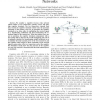Free Online Productivity Tools
i2Speak
i2Symbol
i2OCR
iTex2Img
iWeb2Print
iWeb2Shot
i2Type
iPdf2Split
iPdf2Merge
i2Bopomofo
i2Arabic
i2Style
i2Image
i2PDF
iLatex2Rtf
Sci2ools
126
click to vote
PIMRC
2010
IEEE
2010
IEEE
Optimal beamforming in cognitive two-way relay networks
We consider a cognitive two-way relay network which consists of two transceivers (primary users) and multiple cognitive terminals. The two transceivers transmit their data toward the cognitive terminals which sense the spectrum constantly. If the primary users are in operation, the cognitive terminals act as relay nodes by multiplying the received signal by a beamforming coefficients and then broadcasting the soobtained signal to the transceivers. When the primary users are not in operation, the cognitive terminals communicate with a base station (BS) to increase the overall throughputs. Our aim is to optimally calculate the beamforming weight coefficients so as to minimize the total transmit power of the two transceivers and the cognitive radios subject to three constraints on the received signal-to-noise-ratios at the two transceivers and at the cognitive BS. Simulation results show that the sum-rate of the cognitive two-way relay network is increased while the total transmit power i...
Related Content
| Added | 14 Feb 2011 |
| Updated | 14 Feb 2011 |
| Type | Journal |
| Year | 2010 |
| Where | PIMRC |
| Authors | Ardalan Alizadeh, Seyed Mohammad-Sajad Sadough, Navid Tafaghodi Khajavi |
Comments (0)

